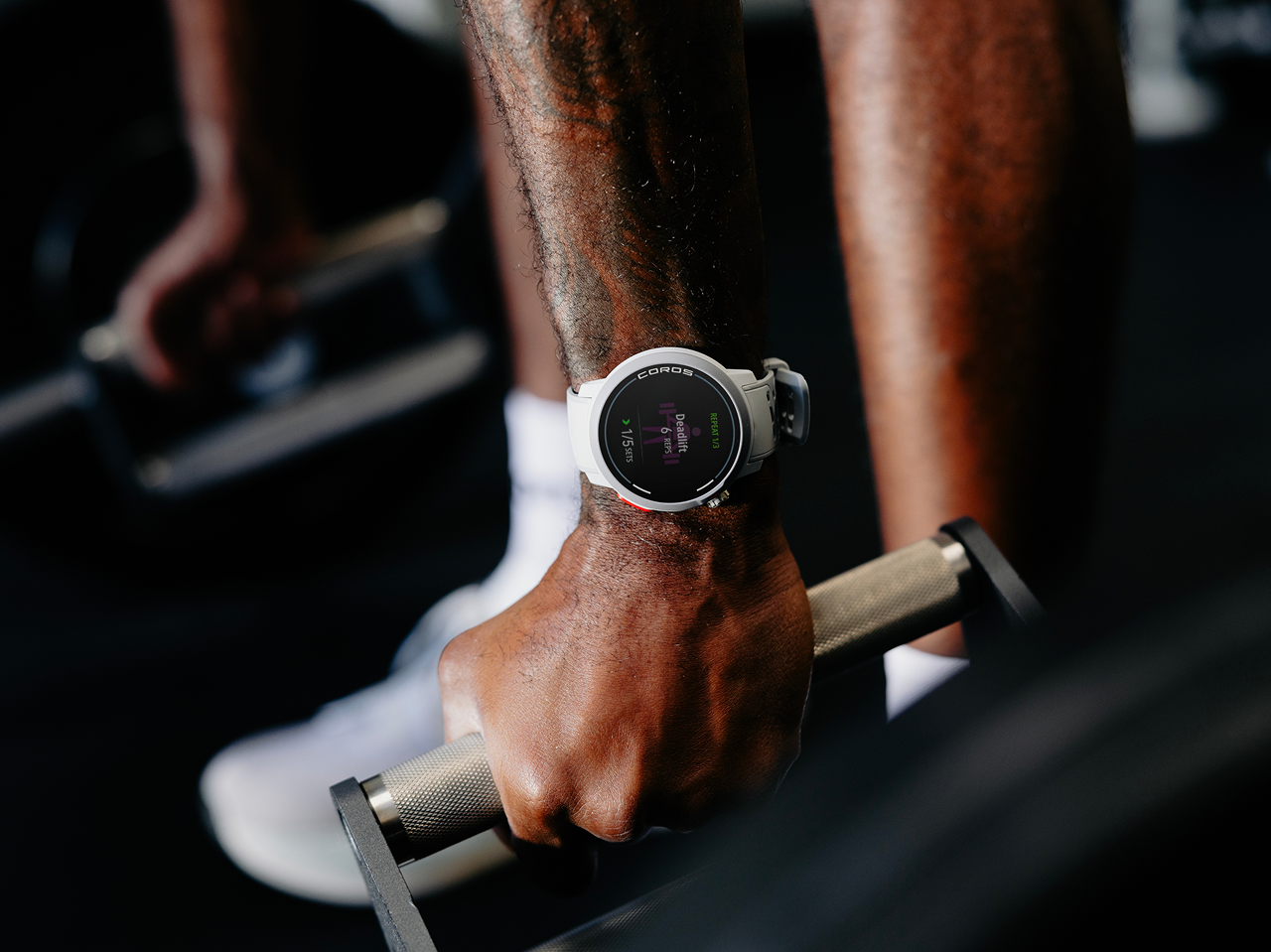Training for a marathon is a unique and personal journey for everyone, and there's no one-size-fits-all approach. Deciding when to start your training plan is crucial, as it can impact your overall performance and experience on race day. The most common training plan durations are typically 20 weeks, 16 weeks, and 12 weeks long. COROS Coaches look at the benefits of each to help you decide which is the best fit for you.
Choosing the Right Plan for You
When deciding which training plan to follow, consider your current fitness level, running experience, and personal goals. Beginners and those with less running experience will benefit from a longer, more gradual plan, while intermediate and advanced runners can opt for shorter, more intensive programs.

20-Week Marathon Training Plan
A 20-week marathon training plan is perfect for those new to running or those who prefer a more gradual increase in mileage and intensity. This extended period allows for a slow and steady build-up, reducing the risk of injury and giving your body ample time to adapt to the increased training load and intensity.
COROS EDUCATION: For most training plans, you may notice a progression in Weekly Training Load during 3-4 weeks followed by a recovery week, then back at it again. This is a proven way to make sure you are training efficiently towards your goals.
Runners should be prepared to run between 5-6 days a week with mileage ranging from 15-60 miles depending on the training plan. Each 20-week plan will be made up of the same training phases:
- Weeks 1-4 Preparation phase focuses on gradually increasing mileage with easy, steady-paced runs.
- Weeks 5-8 Base phase continues to gradually increase mileage with a combination of easy-paced runs and interval workouts.
- Weeks 9-16 Build phase with a gradual increase in long runs that will include goal pace speed work.
- Weeks 17-18 Peak training phase with the longest runs, maintaining intensity.
- Weeks 19-20 Race phase includes your taper and race week. This is the time to reduce mileage and intensity, focusing on recovery leading up to the marathon.
COROS Training Plans
20-Week Beginner Marathon Training Plan
20-Week Intermediate Marathon Training Plan
20-Week Advanced Marathon Training Plan
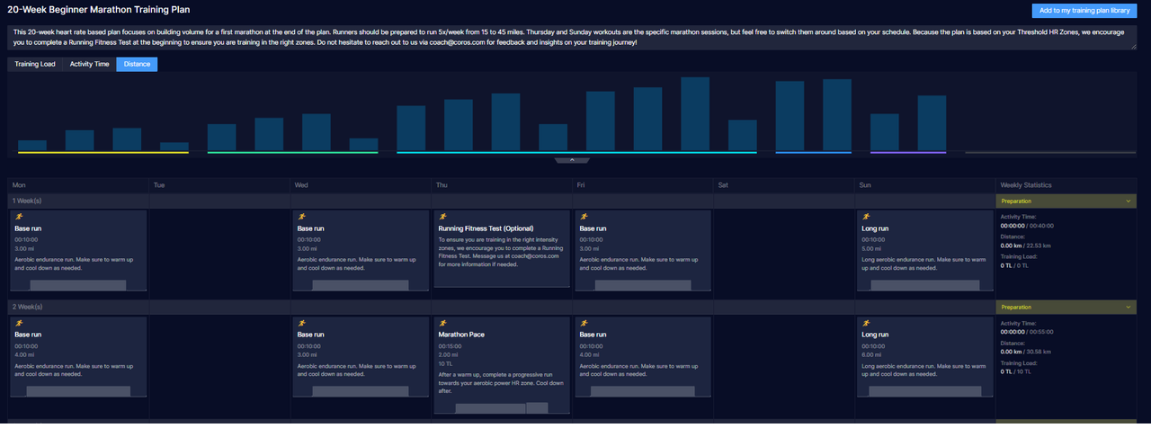
Preview of the 20-Week Beginner Marathon Training Plan
16-Week Marathon Training Plan
A 16-week plan is a popular choice for runners who already have a base level of fitness and some experience with running. This plan offers a balanced approach, providing enough time to build endurance and improve speed without feeling too rushed.
Runners should be prepared to run between 5-6 days a week with mileage ranging from 15-60 miles depending on the training plan. Each 16-week plan will be made up of the same training phases:
- Weeks 1-4 Base building with moderate mileage and introduction of speed through strides.
- Weeks 5-12 Build phase with an increase in long runs, adding threshold and goal pace runs.
- Weeks 13-14 Peak training phase with goal pace long runs and interval training.
- Weeks 15-16 Race phase includes your taper and race week. This is the time to reduce mileage and intensity, focusing on recovery leading up to the marathon.
COROS Training Plans
16-Week Beginner Marathon Training Plan
16-Week Intermediate Marathon Training Plan
16-Week Advanced Marathon Training Plan
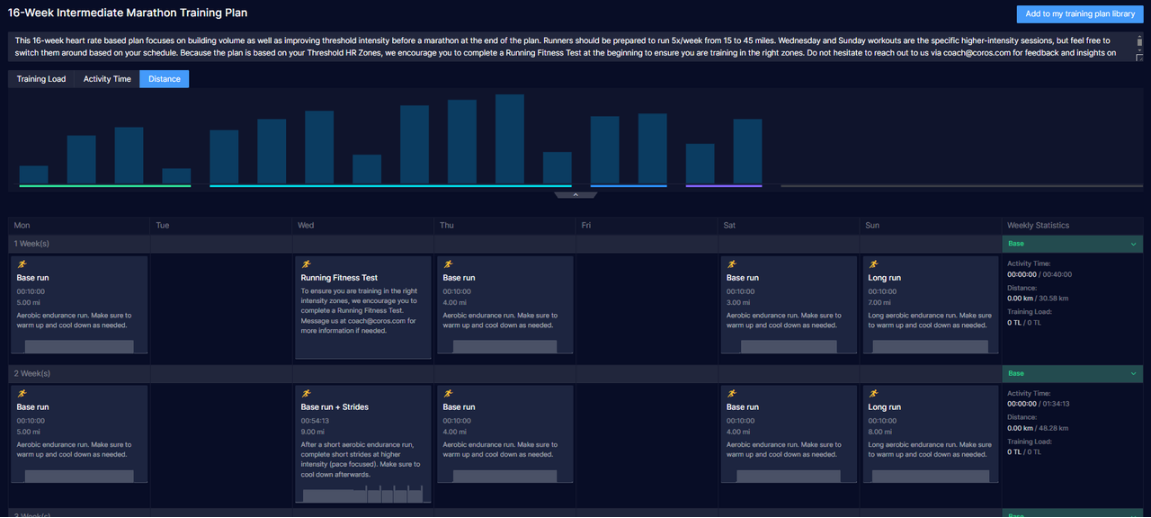
Preview of the 16-Week Intermediate Marathon Training Plan
The COROS Personalized Marathon Training Plan will use your recent training data and create a complete training plan for you to help you reach your racing goals. This plan can be started anywhere between 8-17 weeks from your goal race date. Keep in mind that because it is tailored specifically to you, the personalized plan may not follow the same training phases and structure as our premade plans.
12-Week Marathon Training Plan
A 12-week training plan is best suited for experienced runners who already have a solid base mileage and prior marathon experience. This plan is more intense and requires a higher base fitness from the start. It’s designed for those who can handle the rigors of marathon training with a shorter preparation time.
Runners should be prepared to run between 5-6 days a week with mileage ranging from 26-60 miles depending on the training plan. Athletes starting any of these programs should have a base volume of 25-40 miles a week. Each 12-week plan will be based on a specific time goal so the training phases, training load, and intensity will vary.
Athletes will complete a mix of threshold intervals mid-week, aerobic endurance base miles for volume, and marathon-specific workouts to dial in their pacing.
COROS Training Plans
12-Week Marathon Plan (4:00-4:30)
12-Week Marathon Plan (3:15-3:35)
12-Week Marathon Plan (2:45-3:00)
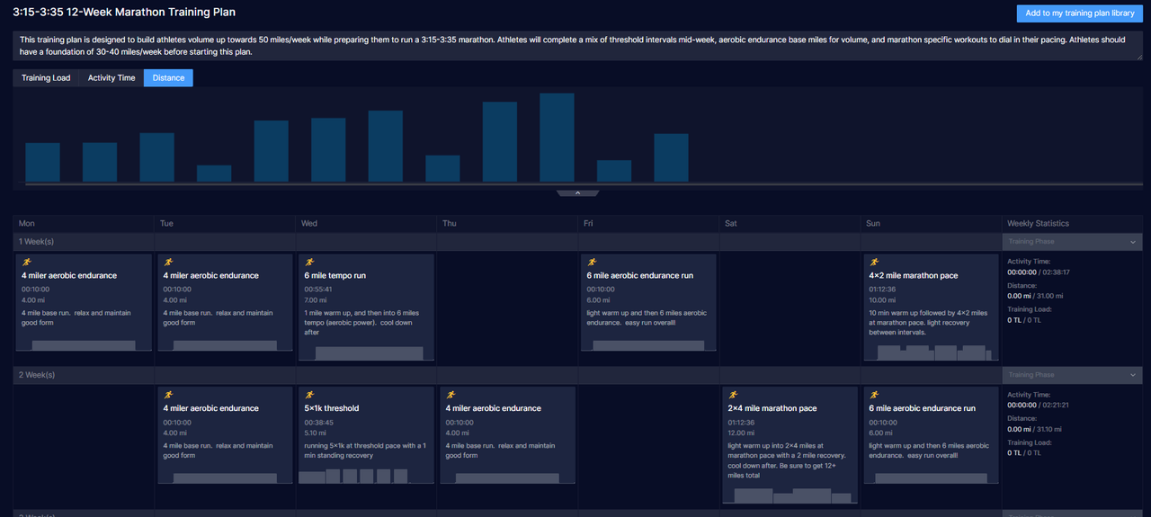
Preview of the 12-Week Marathon Plan (315-3:35)
COROS Coaches Tips
Ultimately, the best training plan is one that aligns with your individual needs, lifestyle, and goals. Whether you opt for a 20-week, 16-week, or 12-week plan, consistency, dedication, and listening to your body are key to a successful marathon experience. Here are some key points to keep in mind:
- Set Realistic Goals: Define your goals. Are you aiming to simply complete the marathon, or are you targeting a specific time? Your goals will influence the intensity and structure of your training plan.
- Lifestyle and Commitments: Assess your personal and professional commitments. Choose a plan that you can realistically stick to without causing extra stress.
- Listen to Your Body: You know your body best, if you have a history of injuries going with a longer and more gradual plan may be the better option. Use your Training Status metrics to help track the impact of recent training on your body.
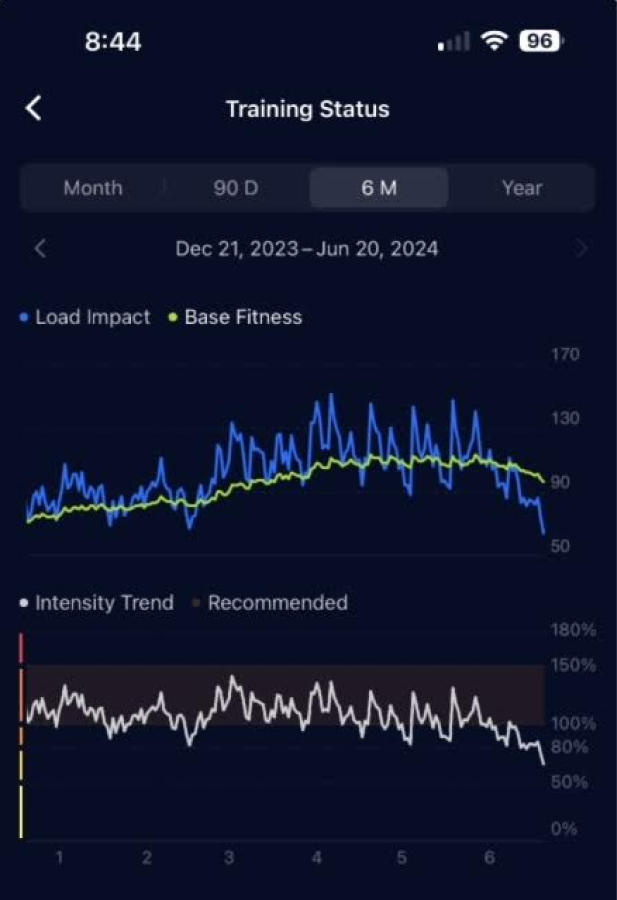
Training Status as seen from the COROS app.
All of our COROS training plans will based on your threshold heart rate and/or threshold pace zones. To ensure you are training in the right intensity zones, we encourage you to complete a Running Fitness Test at the beginning of your training cycle. This is a higher-intensity workout, so if you are newer to running, reach out to COROS Coaches for more guidance.
Start with a plan that feels achievable and adjust as needed, keeping the end goal in sight: crossing that finish line feeling strong and accomplished!

/filters:quality(90)/fit-in/970x750/coros-web-faq/upload/images/464e1c339c14f437d3bed95ea885c76f.png)





